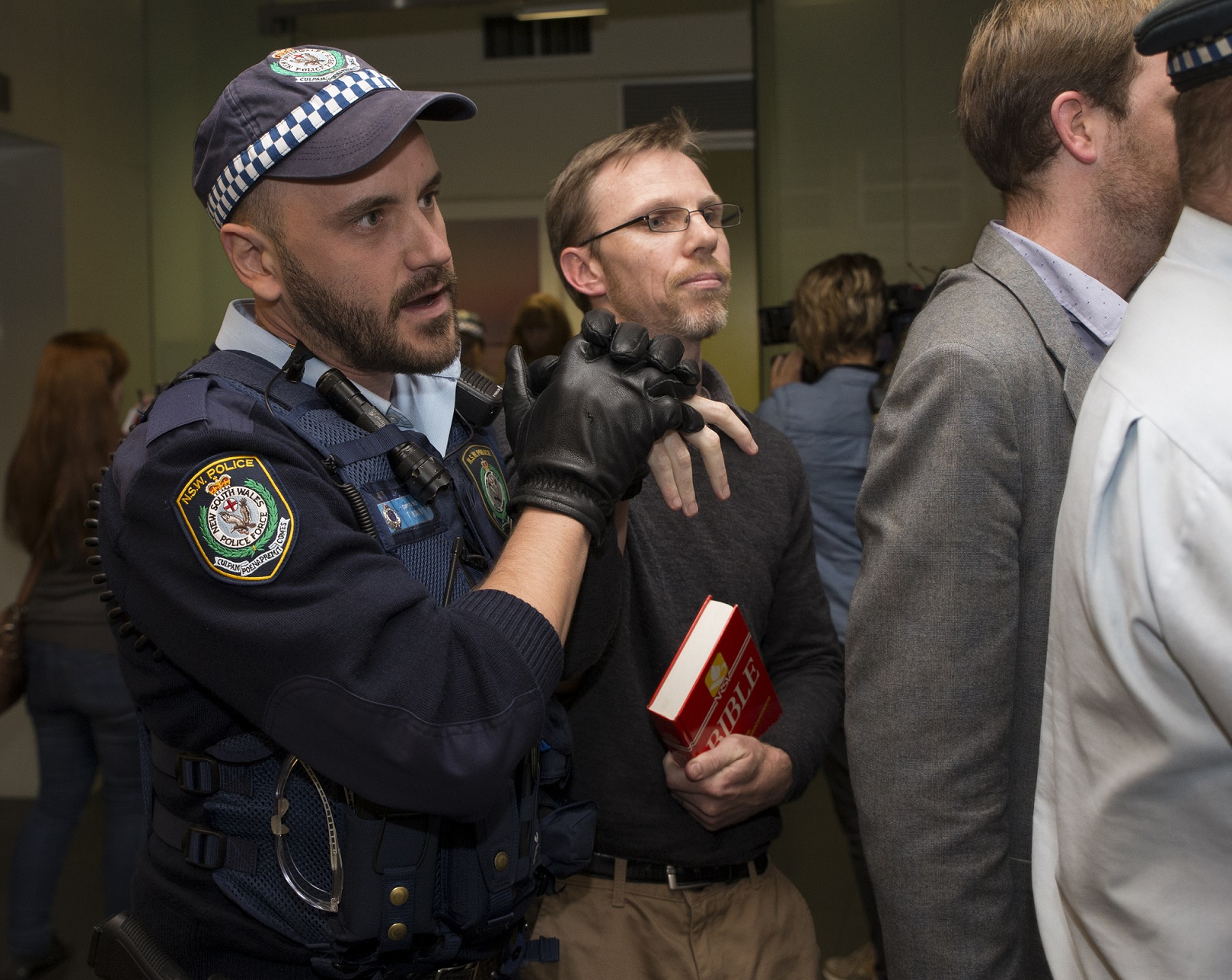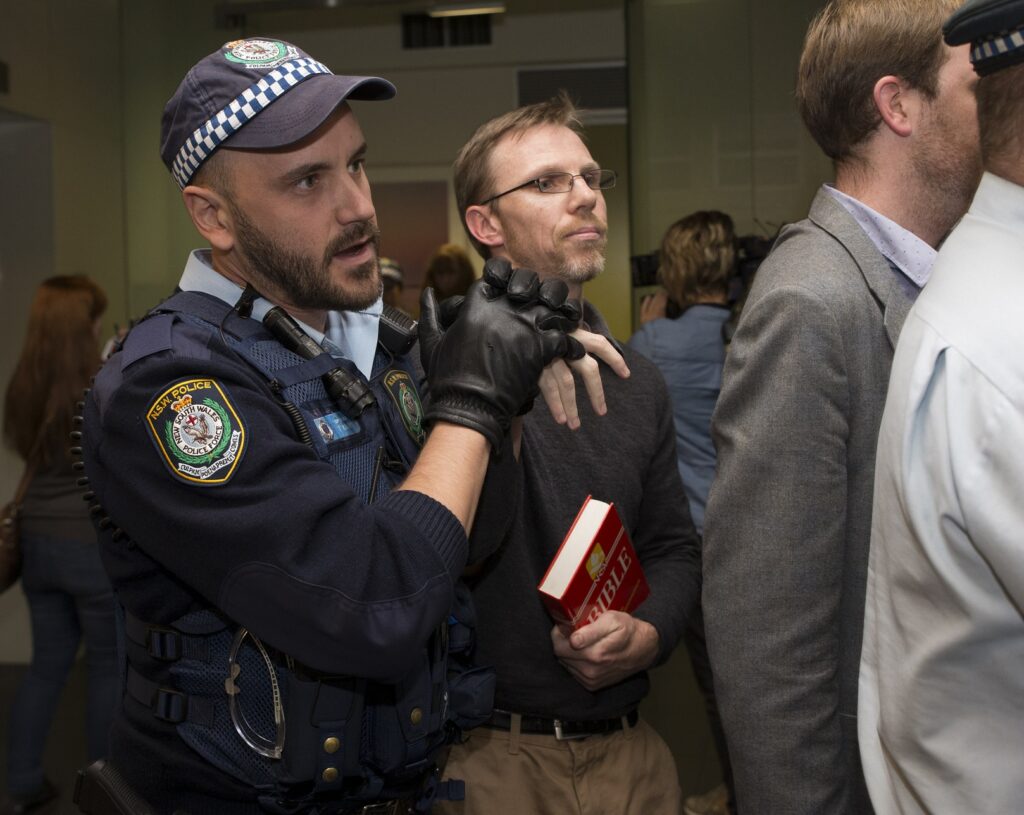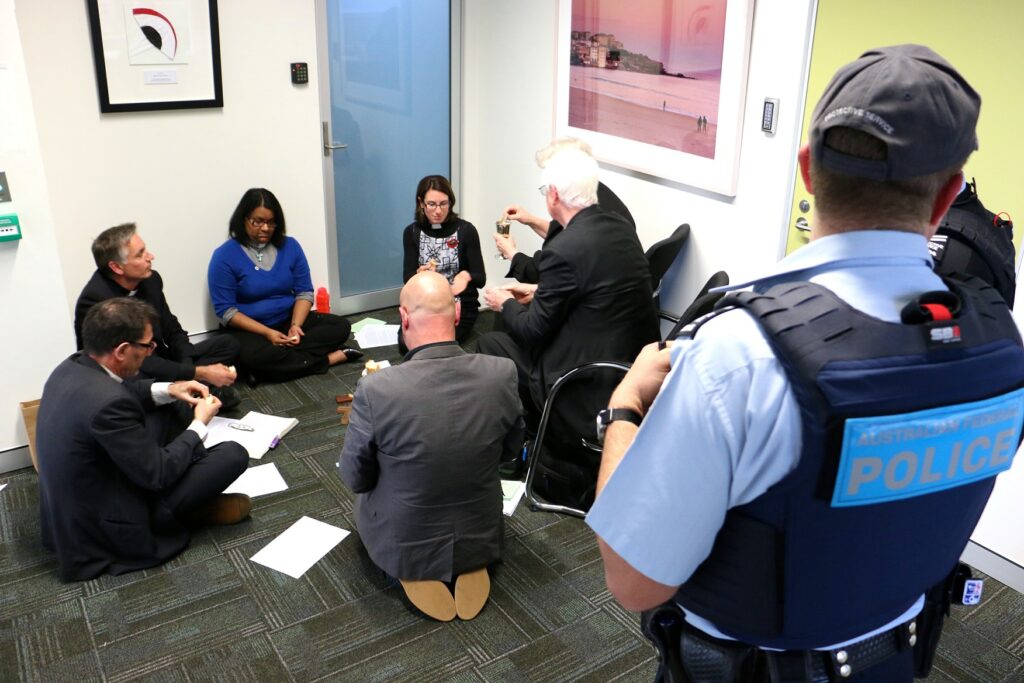Christian activists in Australia repeatedly risk arrest when they call attention to the plight of asylum-seekers suffering mistreatment in indefinite detention.
One of the activists is Matt Anslow, vice president of the Anabaptist Association of Australia and New Zealand. With some friends, he co-founded the organization Love Makes A Way (LMAW) in 2014 to take action on behalf of the detained asylum-seekers.
Although Anslow describes Anabaptism as “extremely small” in Australia, he said Anabaptists have made up a disproportionate number of the nearly 300 people who have participated in LMAW actions.
“Because that Anabaptist flavor has been so central to the flavor and organizing of Love Makes A Way, . . . people find themselves looking toward Anabaptists for leadership and guidance about the way we operate this movement,” Anslow said.
He calls LMAW a response to Australia’s “cruel policies” toward those seeking safety as refugees.
“Rather than caring for people seeking asylum in the country, we have locked them in detention cells arbitrarily and indefinitely,” he said.
According to a case fact sheet from Amnesty International, those in detention are primarily from Iraq, Iran, Afghanistan, Sri Lanka, Myanmar, Sudan and Somalia and “are being held in a prison-like regime, in extremely cramped compounds in stifling heat, while being denied sufficient water and medical treatments.”
On March 21, 2014, Anslow and eight other Christians entered the office of then-Immigration Minister Scott Morrison, saying they would remain and pray until they received a statement that the 1,138 children in detention would be released.
“We prayed for the next three and a half hours, for people in the detention centers, for the immigration minister, for the staff, for the community, for the police who eventually came and arrested five of the group,” Anslow said. “The five who were arrested were detained and released, having been charged with trespassing. They went to court about a month later, and the magistrate dismissed all the charges, saying that if there was ever a peaceful protest, this was it.”
Their request was not granted, but the group caught the attention of other Christians throughout Australia.
“We’ve been able to unearth a lot of tension our government basically tried to keep hidden,” Anslow said.
Since then, LMAW organizers have held more than 30 sit-ins, vigils or similar actions across the country.
The way Jesus taught us
“When we started Love Makes A Way, we were pretty clear that any action we did, we wanted to reflect our faith,” Anslow said. “When we did our first action, it was quite different than actions from other groups. We were trying to reach out, not to pulverize them. We wanted to reach out to people in the church who were on the fence or on the other side of the fence.”
Anslow said the group’s methods are based on Jesus’ teaching of loving enemies and Martin Luther King Jr.’s idea of transforming opponents.
“It comes out of our wider commitment to nonviolence, which is something we learn from Jesus,” he said. “It’s not just a pragmatic thing; it’s the way Jesus taught us that we ought to live.”
With some exceptions, the police have treated the activists respectfully. Some officers have even privately expressed support.
“We’ve had police tell us we’re the best people they’ve ever had in lock-up,” Anslow said.
In keeping with their commitment to peace, LMAW participants bring treats to the office staff members who call the police.
“Sometimes they don’t like us, because the actions are quite bold and dramatic,” Anslow said. “But we need to speak boldly about the injustices being done. We aren’t trying to alienate people. . . . We’re trying to beckon our opponents to do the right thing.”
No church, but events
While LMAW and the Anabaptist Association of Australia and New Zealand (AAANZ) have no formal affiliation, several people are involved in both organizations.
Mark and Mary Hurst from Lancaster, Pa., serve with Mennonite Mission Network as pastoral workers for AAANZ. They helped organize it in 1998.
AAANZ is a resource network for people interested in Anabaptism. The Hursts travel around Australia and New Zealand to give workshops about peacemaking and conflict transformation, and they send out a weekly email with resources online.
“We’ll get an email from someone saying, ‘I think I’m an Anabaptist; is there a church I can go to?’ ” Mark said. “Sometimes we’ll try to find something in their area, but we often tell them, ‘No, but here’s an event you can come to.’ ”
The Hursts have twice been arrested in the past year while participating in LMAW activities.
AAANZ will hold its On the Road Conference Jan. 27-29 in Sydney. The theme is “Called to Community.”
AAANZ President Gary Baker said the network has provided resources for LMAW activists’ court cases, such as letters and character references.
Because AAANZ isn’t a church, it has no statement of faith. Its members are mainly individual people from various Christian traditions who are interested in Anabaptism.
Baker said he grew up in the 1950s hearing radio news of the threat of nuclear war. As a medical doctor, he came into contact with Mennonites while working in the U.S.
“That helped me understand the core attributes of the Anabaptist church,” he said. “God is really love, and that gets expressed in caring, sharing and doing no harm.”
Baker attended the 2015 Mennonite World Conference assembly in Harrisburg, Pa.
“I was impressed by the huge range of diversity in the Mennonite world,” he said. “I felt that there was a simplification of what it is to be an Anabaptist. That was the thing that held everyone together at that meeting. I came away feeling much more aware of what the gift of Anabaptism is — that we help people come together to live.”
A faith that makes sense
Before Anslow got involved with AAANZ, he had heard of Anabaptism but didn’t quite understand it.
He had come to believe that nonviolence and community were central to following Jesus and that “we needed a different hermeneutic for reading the Scriptures than the flat reading of the Bible. . . . I came into contact with the network and realized, ‘Hey, here’s a group for whom this is true.’ ”
Anslow said many Christians in their 20s go through “a time of deconstruction and trying to reconstruct their faith,” which brings them to an understanding similar to Anabaptism.
“They might have read Anabaptist thinkers or theologians without realizing who they were, because Anabaptism isn’t a tradition in Australia,” he said. “What they’re finding with Anabaptism is like it’s coming home. . . . There’s a historical tradition that helps their faith make sense now.”
Printed originally in Mennonite World Review. Used with permission.











Leave a Reply
You must be logged in to post a comment.